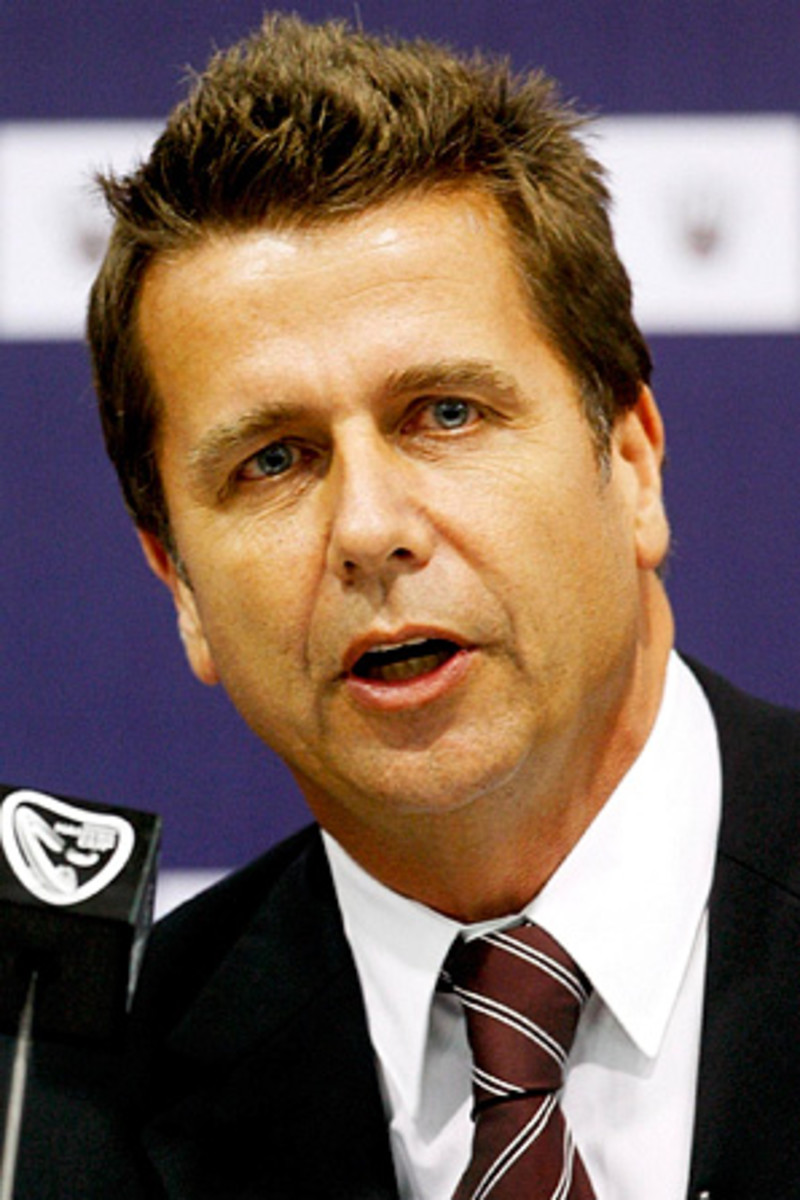Challenges await new ATP leader
The ATP announced Thursday that Brad Drewett would be its new leader. SI.com caught up with Sports Illustrated senior writer Jon Wertheim to discuss the move.
SI.com: What do you make of the appointment of Brad Drewett to executive chairman and president?
Wertheim: Finally! In terms of fierce and protracted battles in men's tennis in 2011, Novak Djokovic, Roger Federer, Rafael Nadal and the gang had nothing on the ATP executives. CEO Adam Helfant announced in late spring that he would not seek a renewal of his contract. Thus began a six-month search that was rife with the infighting and jostling that, too often, has come to characterize the ATP. Crassly: The tournaments want a chief executive who will ask more of the players and resist calls for prize money increases. The players want a chief executive who will be sympathetic to their demands, their bodies and, of course, their financial interests. (If you're wondering how the ATP can be effective when, ostensibly, it represents both "labor" and "management," well, you're not alone.)
Leading the global sport of tennis? With fairly sound financials? A dazzling on-court product? A raft of honorable top players? This should be one of the real plum positions in sports. That it took half a year to fill? That speaks -- unflatteringly -- to a lot of issues, not least the inherently flawed structure. On the other hand, the ATP filled the position. With a quality leader. Before the year ended. And the vote among board members was unanimous. So onward we go ...
SI.com: Was the selection of Drewett expected?
Wertheim: Well, this search resembled one of those scoreboard dot races, with candidates surging and then fading, often inexplicably. Initially, I was told that many in the ATP felt deeply burned by Helfant (who came from Nike and left prematurely in the eyes of many) and would look to an internal candidate -- which meant Drewett or the ATP's longtime lawyer, Mark Young. There wouldn't be the need to engage a search firm. They knew the politics and the players and wouldn't need the orientation. The salary demand would be reasonable.
Then former Wimbledon champion Richard Krajicek emerged as a candidate. In the fall, the board spoke with Ian Ritchie, the top Wimbledon executive, who would have been an excellent choice, a real "compromise candidate" with strong relationships with the Grand Slam chieftains. His candidacy was squashed (cue: finger-pointing) and Ritchie ended up taking a position with the Rugby Football Union. When Krajieck pulled out earlier this month, we were down to Drewett and Young again.
SI.com: What can you tell us about Brad Drewett?
Wertheim: He's an Australian, a former player and a longtime ATP executive based mostly in the Asia region. He's well-liked and well-regarded and shies away from controversy. He's an insider -- which is both good and bad -- but I think he comes in with a fair amount of political capital.
SI.com: How do the players feel about this?
Wertheim: It's interesting. I was told by multiple sources that Roger Federer and Rafael Nadal had a real disagreement about Krajieck. Nadal was in favor of his candidacy; Federer was opposed. If you recall the kerfuffle during the U.S. Open, there is clearly a fair amount of frustration with the ATP among the players. There was talk about starting a bona fide union, of re-examining the entire system. That talk has died down a bit. But, suffice to say, Drewett's address to the players in Melbourne next month will be important.
SI.com: What is his mandate?
Wertheim: This is the crux of the problem: The mandate is very different depending on which faction has the conch. Everyone wants more money. The tournaments -- particularly the smaller ones -- feel like they're getting squeezed and not getting the necessary support from the ATP. The top players feel like the season is too long, the demands on their time and schedule are excessive, and they're not compensated commensurate to their value. The rank-and-file players are happy for the opportunities -- they want more tournaments, not fewer -- and would like to see a more equitable distribution of prize money.
Apart from generating more sponsorships and more favorable television and media deals, Drewett will have to figure out how to approach the four Grand Slam events. The Slams are terrifically profitable and allocate a scandalously low percentage of their revenue to the players as prize money. On the other hand, the players don't have much leverage here. The majors are the tentpole events -- the four tournaments on which reputations are built, and they still pay the most relative to other events -- and until the players are prepared to take drastic action, it's hard to see why or how the majors will feel pressure to act.
Say this about Drewett: He goes into this job with his eyes wide open, fully aware of the landscape and the land mines. This almost takes on the dimensions of a classical quest. Let's see how he fares fighting tennis' equivalent of the Harpies and the Amazons, resisting the Sirens, crossing the Scylla of the ITF and the Charybdis of the USTA. Godspeed, Brad Drewett.






